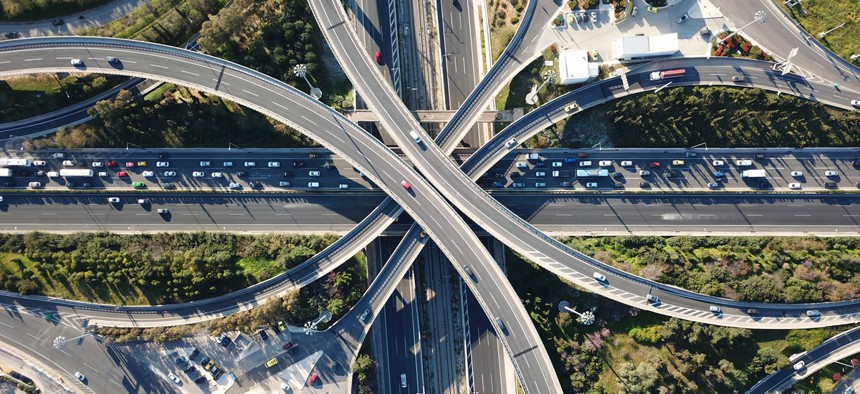Highway Administration to Explore How AI and Blockchain Can Transform Transportation

Aerial-motion/Shutterstock.com
The agency aims to spur innovation through “longer-term, higher risk” research.
The Federal Highway Administration launched an Exploratory Advanced Research Program this week to usher in "transformational changes and truly revolutionary advances” in highway engineering and intermodal transportation on roads across the United States.
According to a new broad agency announcement, the administration is accepting research effort proposals—with the deliberate intent of awarding either contracts or cooperative agreements—that address three trendy topics in emerging tech: blockchain for highway transportation, artificial intelligence for highway transportation, and incorporating trashed plastic into asphalt cement to reduce waste.
“This program supports scientific investigations and studies that advance the current knowledge and state-of-the-art in the sciences and technologies employed in the planning, design, construction, operation, maintenance and management of the nation’s highways,” officials wrote in the announcement. “Strategically, this research will enable and expedite the development of revolutionary approaches, methodologies, and breakthroughs required to drive innovation and greatly improve the efficiency of highway transportation.”
The agency’s EAR programs aim to produce strong public-private partnerships that catalyze solutions through “longer-term, higher risk” research. To inform its ultimate intent, FHWA conducted an extensive investigation ahead of the launch, through which it met with a “large number of stakeholders from within and outside the traditional highway research community to identify topics of research that promise transformation and possible breakthroughs in highway technology, processes and policies.” With explicitly inherent exploratory aims, the agency doesn’t expect the initial results to be immediately implementable but instead plans to further develop them over time.
The agency said it could make multiple awards for each of the following topics:
Blockchain Technology for Highway Transportation
Mostly known for underpinning Bitcoin, blockchain is a record-keeping technology that validates information on a decentralized public ledger. Though it’s still nascent, the agency argues that blockchain “has the potential to transform the connected and automated vehicle industry or freight logistics providing a platform to share a variety of information from the infrastructure and vehicles in a secure manner.” Further, the agency’s hopeful that it can provide “security and scalability at lower costs than current private network solutions” and offer a wide range of new technological functions.”
FHWA wants proposals that explore how blockchain applications could enable more secure traffic operations and car-to-car and car-to-infrastructure communications, anonymized freight data management, auction-based mechanisms for highway pricing, and beyond.
Artificial Intelligence for Highway Transportation
The EAR program previously funded AI-focused efforts that incorporated computer vision and natural language processing, but this time around the agency hopes for projects that empower the use of its growing heaps of data. In this light, the agency said it welcomes proposals that connect traditional and non-traditional highway data to make predictions around the system’s performance, improve sensor signal data that are used to evaluate roads and structures, provide decision support in highway system design, and more.
Compatibilization of Waste Plastic to Enhance Mechanical Properties of Asphalt Cement
Sourcing the Environmental Protection Agency, and National Asphalt Pavement Association, FHWA officials estimate that more than 34 million tons of plastics are disposed of each year, while 350 million tons of asphalt pavement are produced in America annually. “Given the ubiquity of asphalt pavements nationwide, there exists an opportunity for significant reductions in landfilled plastics by incorporating these materials [in plastic waste] into asphalt mixtures,” officials wrote. The agency said it welcomes research that is focused on developing processes or materials that advance the compatibility between cement and plastic waste.
FHWA added that it will continue to look into other research areas to identify future opportunities in the program. Interested entities are invited to submit any questions they have regarding the project by Feb. 18, and research proposals are due by March 20.






